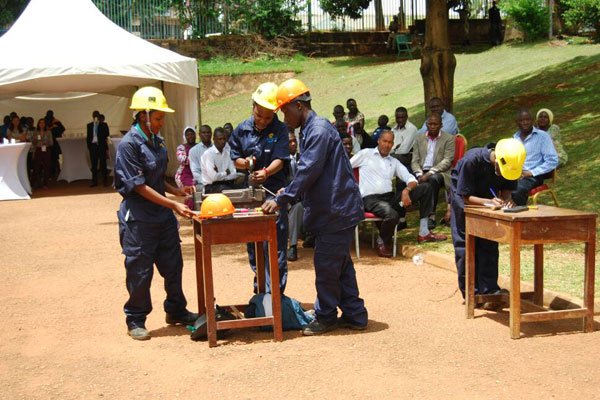
While interacting with students from different schools at the Youth Leadership Seminar at Makerere University Africa Hall last week, it was evident that a big number, almost three quarters of the students we randomly sampled, had never received any career guidance about vocational studies.
“While joining high school, the head of career and guidance at my new school told us the benefits of scoring good grades, so we can join university. Nothing was mentioned about vocational studies,” John Tendo confessed. This was only to affirm the limited career knowledge about vocational studies made available to students as they prepare for their future career paths.
And Julia Ninsiima, a student at Rukore Community Polytechnic, in Mbarara says it was due to the career guidance given by her mother interesting her to consider technical course as a viable career path, that led her to pursue tailoring.
“She knew I loved designing things, and coming up with all kinds of fashions. Personally, I was hoping I could join Makerere University on government scholarship like I was seeing with most students,” Ninsiima says. “Over time, as she guided me further about my career choices, I realised that I actually wanted to tailor. Had it not been for that knowledge, perhaps I would not be doing what I am passionate about,” she adds.
The lack of information
Kambaho Narasi Anyijuka, the senior information and communication officer at the Uganda Business and Technical Examinations Board (UBTEB), notes that teachers in primary, secondary schools and career counsellors lack sufficient information on the vocational education sector and its role in economic development.
“In my primary and secondary school, nobody ever mentioned the career options in Uganda other than the routine primary seven to secondary to university path. That was all,” Narasi says adding that even during career guidance sessions by teachers, counsellors, motivational speakers, parents, and students themselves, the career options in Uganda are two after primary level; join secondary or if you have failed, join vocational line.
“There is a failure to recognise the career path ways for candidates joining vocational institutes at each level and the courses offered as well as the skills obtained. There is limited knowledge on the new curriculum and the establishment of new technical and vocational institutions,” Narasi says.
He also points out high youth unemployment levels which is attributed to lack of employable skills.
“For a fact, vocational graduates are better placed to get jobs or create them during or after completion of studies. Take for instance cases of students doing nursing, midwifery and catering among others,” Narasi says.
Role models sought
According to Narasi, this information gap calls for joint efforts from private sector players, government and all citizens to create awareness and intensify career guidance in primary and secondary schools.
“People should exploit the use of social media to explore career growth trends versus accumulation of paper qualifications for prestigious reasons,” he says.
Furthermore, Gertrude Abalo, the principal Fisheries Training Institute Entebbe, believes the reason most people career guidance experts do not consider vocation as a career path is because they have never gone through the system, so they have no idea the benefits there are.
“The solution then is to reach out to students and young people which calls for role models into play. People who have gone through vocation training and succeeded sharing their experiences,” she says.
Best Babirye, an electrical engineering student at Kichwamba Technical College, in Bundibugyo District says, “Over time, support has been given to vocational training institutes. They have workshops, machines, equipment adequate in giving relevant training and we receive skills that are relevant in our context as a country. It is, therefore, upon the parents and the students themselves to look at vocation as an option, not an afterthought.”
“I believe that Uganda is in need of skilled labour. Those skills are taught in technical school. So while giving career guidance, vocational studies should be looked at as an equal opportunity with academic careers,” Joseph Mulindwa, a student from Lubiri Secondary School, says.
Some courses P7 dropouts can offer
1. Block Laying and Concrete Practice
2. Plumbing and Pipe fitting
3. Carpentry and joinery
4. Welding Metal and fabrication
5. Motor vehicle Mechanics
6. Electrical Installation
7. Leather tanning and shoe making
8. Garment design and construction
9.Food Processing and production
10. Community Polytechnic Certificate in Agriculture
11.Commercial Livestock production
12.Commercial Crop production
13. Business Studies (Secretarial studies, Accounting, Computer Studies, Store keeping).
